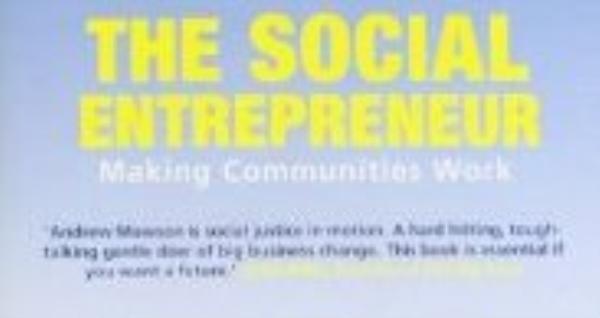The only disappointing thing about this book is its title. True, it describes both topic and author, but I fear that its matter-of-fact-ness will mean that only readers with a prior knowledge of its subject will be likely to pluck it from the shelf and investigate it further. A whole constituency of people who should read it, and whose lives might be transformed if they did, could therefore pass it by.
What they’ll also miss is a ripping yarn, for this is one of those rare non-fiction books which one finds harder to put down than the average novel. Mawson offers such an arresting narrative of his twenty years transforming a part of Bromley-by-Bow in a poor part of East London, and brings to life so vividly the characters with whom he works, that on one level this is simply an ‘enjoyable read’. But it also much more than that, a book to challenge and inspire while also a searing attack on a culture at the heart of politics that is letting down the very people it is seeking to help.
Mawson’s story begins when he arrives to pastor a run-down United Reformed Church in London’s East End in 1984. He finds a dozen members, all faithful and committed but all over seventy, and realises he has several options: to stay in bed every morning and become depressed; to write a thesis on inner-city poverty which no one would read; or to get out into the community and discover what makes it tick. That he took the third option is something for which his faithful flock – and thousands of their neighbours – will be eternally grateful, since it set in train a process which led to the establishment of the first fully-integrated health centre in the UK - bringing together GPs, nurses, arts, education, a three-acre park, sheltered housing, support and care in one fully unified unit – and the generation of hundreds of new jobs and considerable wealth for the community. It also turned Mawson into a social entrepreneur and proved the value of the social enterprise model to get things done – and some very big things at that.
What gives this book its edge is the contrast Mawson draws between the ‘social enterprise’ approach to delivering services and the more traditional methods favoured by central and local government. The dream of the integrated health centre, we are told, emerged from a painful encounter the author had with the authorities ‘responsible’ for the care of a member of his congregation, a single mother in her thirties dying of cancer. That none of these people was prepared to carry the can for her premature death, or even speak of her as a person and not a ‘case’, provoked him into not simply lobbying and campaigning for changes to the health and social services but setting up alternatives. Cue former Tory Health Minister, Dr Brian Mawhinney, for an unexpected cameo role!
For Mawson, the weakness in our present structures for providing services is that the people responsible for designing them have no experience of the coal face, of making things work ‘on the ground’. Instead of proving their worth by making a success of one venture, they design grand schemes based purely on theory which then falter: ‘paralysis by analysis’. Social enterprise, on the other hand, harnesses the experience of business – where things have to work because failure is costly – and applies it to the realm of service delivery. ‘Learn by doing’ is Mawson’s mantra, and his cri de cœur is that if government really wants to bring about change it should back those who have done that learning and proved their success – not those with no experience who promise instant results but will deliver little.
For Mawson, social enterprise is a new model of democracy in that it involves and empowers people much more than voting or engaging with their ‘elected representatives’. In disadvantaged neighbourhoods it enables people to move beyond being passive recipients of welfare to generating wealth for themselves and their communities. It also gives people new horizons, a new sense of the possible: as Mawson encapsulates it, if you ask someone who has only ever used a mangle what they would most like they will say ‘a super-mangle’; the point is to show them the spin dryer!
Mawson’s story is challenging for those who think equality of opportunity still matters, or that socialism, rid of its connotations with eastern Europe, is not a spent force. It’s also unsettling for those who want to ‘make poverty history’ without envisaging a role for business in the process. But it’s also deeply inspirational, a book that really can change the way we think – and, more importantly, act.
Andrew Bradstock is co-Director of the Centre for Faith in Society at the von Hügel Institute, St Edmund’s College, Cambridge. His recent book, Louder Than Words, is also reviewed on this Website. >> Read review






